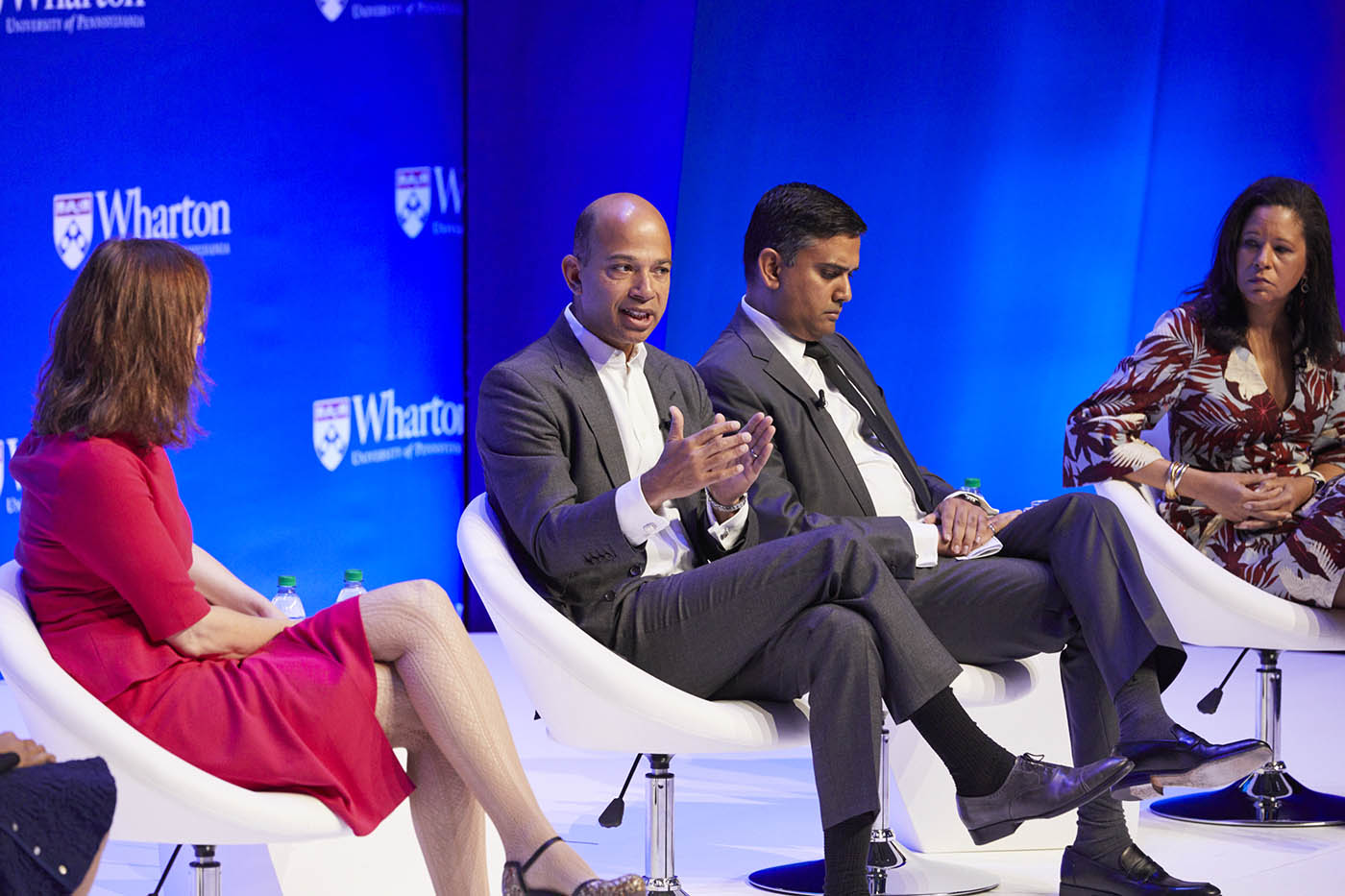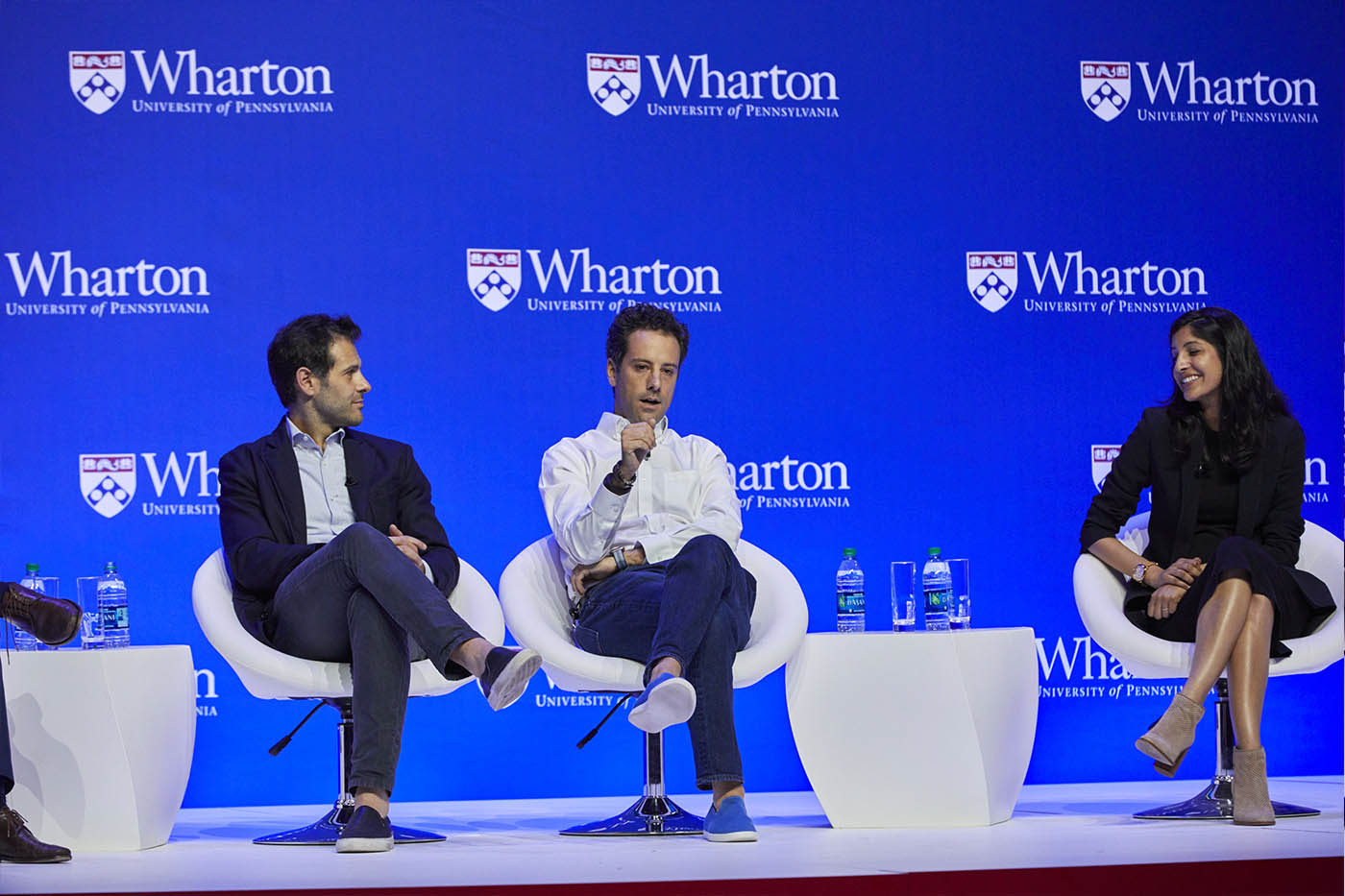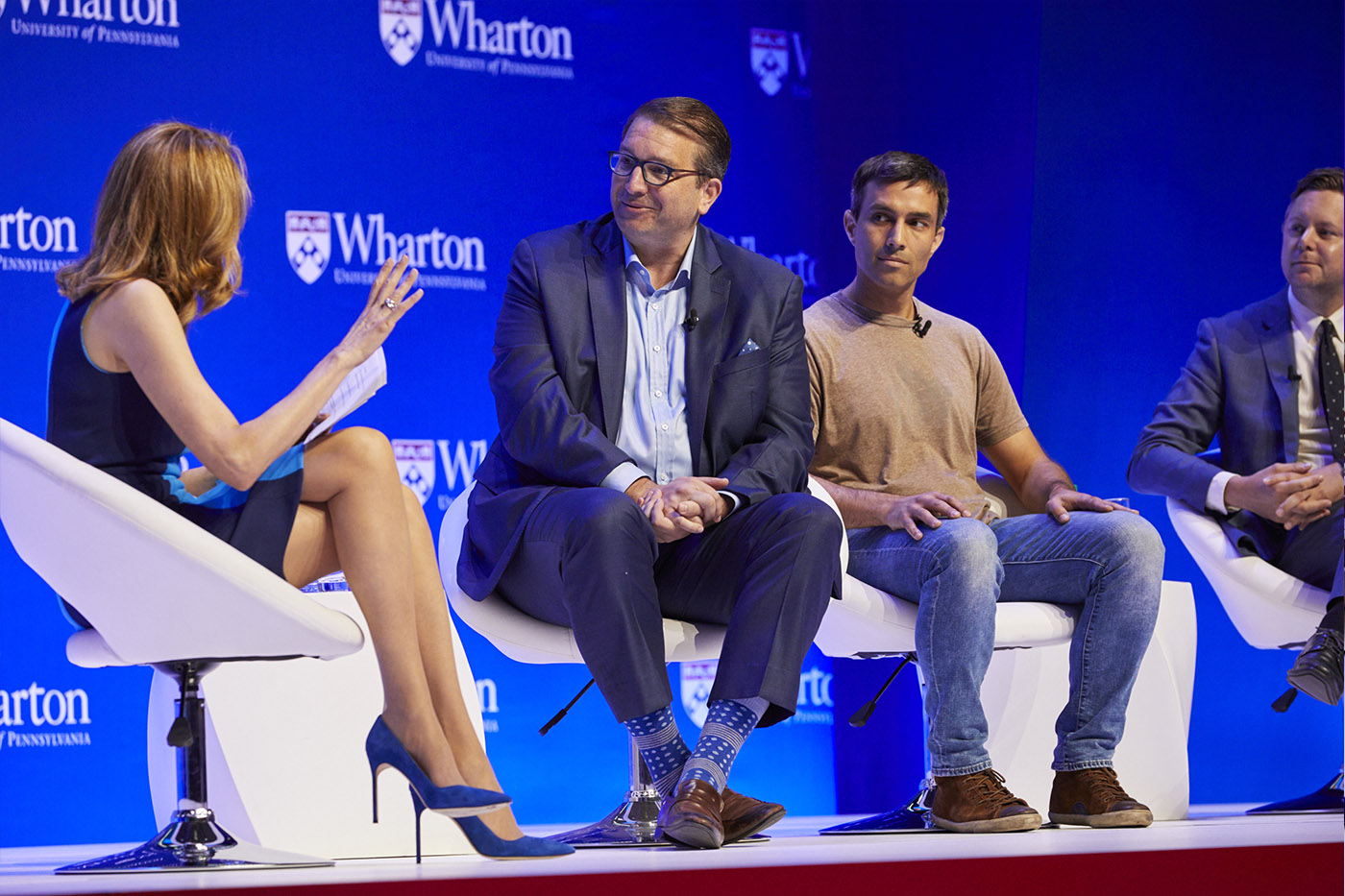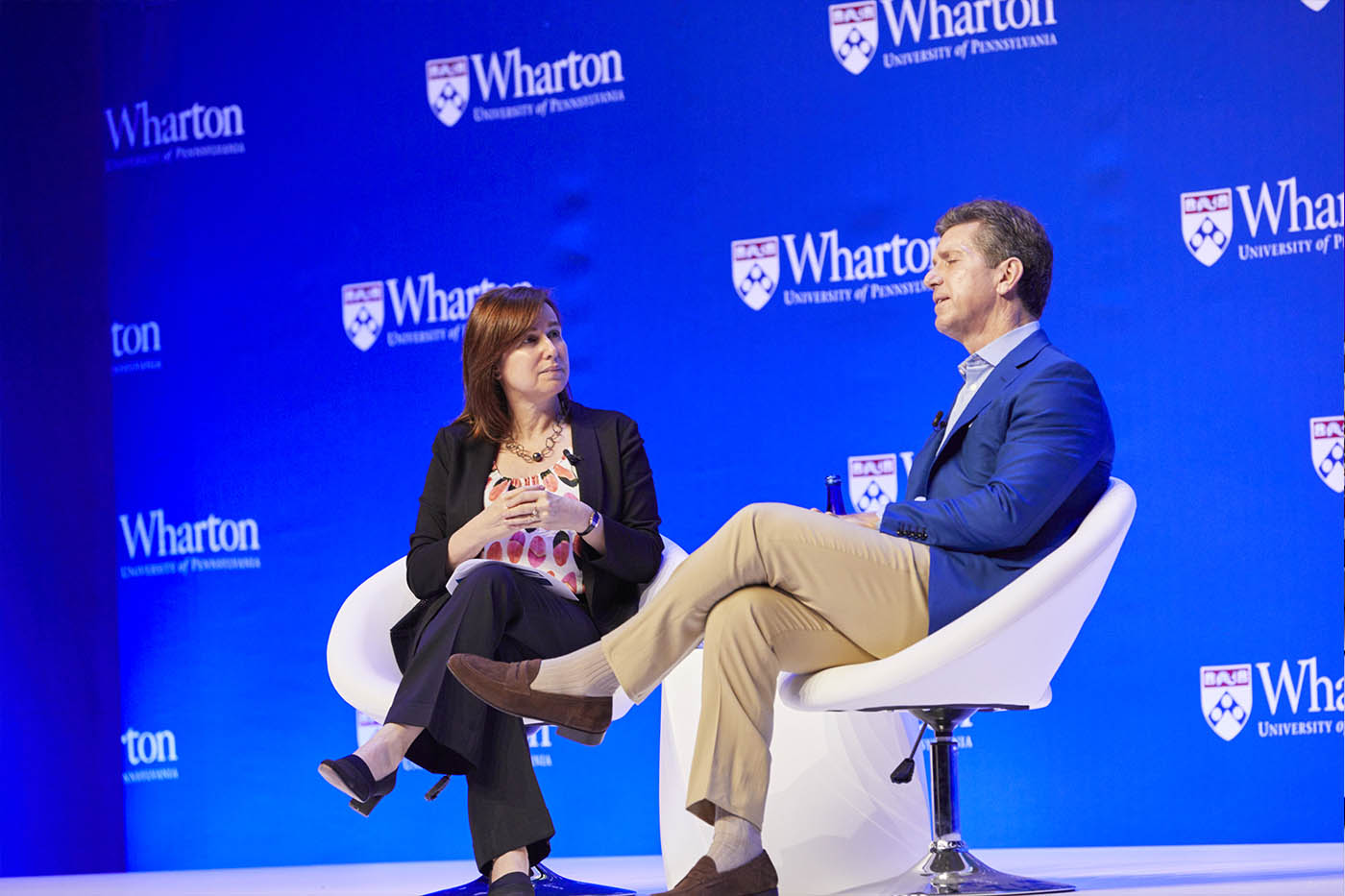Quick Takes on Big Ideas
Sessions you need to know about
One of the hallmarks of any Wharton Global Forum is the auspicious nature of the conversations. Though the keynotes and fireside chats were long-planned, speakers seized the moment and took on the timeliest issues and headlines in business, geopolitics, and economics. Here is a snapshot of some of the key takeaways and perspectives from the Forum.
Diversity: Matching Actions to Values

Speakers:
- Janet Cowell, C’90, G’95, WG’95
CEO of Girls Who Invest - Scott Mills, W’90
President, BET - Ikdeep Singh, WG’07
President, L’Oreal USA - Bonita Stewart
Vice President, Global Partnerships for Google - Stephanie Creary
Assistant Professor of Management (moderator)
Continually questioning and challenging the status quo is at the heart of meaningful diversity and inclusion initiatives. Wharton’s Stephanie Creary asked executives on the Leading for Diversity panel about what drives them to keep diversity a priority as leaders.
The panelists held a wide-ranging discussion that explored the advances and areas in need of improvement throughout corporate culture. Drawing on their experiences, they gave the audience action items to start embracing diversity in incremental efforts while setting a leadership example:
- Singh: Start with intensive recruiting from diverse backgrounds — then assume that people you have hired have potential and support them.
- Stewart: Try the “plus one” approach: Bring someone to a meeting or opportunity who may not otherwise be represented, or offer to swap your place with her.
- Cowell: Many companies can’t answer percentage questions regarding diversity. “We need metrics that matter.”
- Mills: Diversity and inclusion are coming to the forefront because it is a business imperative from the consumer perspective. “You actions have to match up with your values.”
What’s Next? Technology is Creating the Future

Speakers:
- Ben Leventhal
CEO, Resy - Joey Levin, ENG’01, W’01
CEO, IAC - Jon Steinberg
Founder and CEO, Cheddar - Anjali Sud, W’05
CEO, Vimeo
The Future of Technology and the Transformation of Daily Living: Panel Discussion
From declaring television is already over to predicting advances in mobile platform technology that will force business innovation and transform literally everything, this provocative and sometimes fiery panel explored the ups and downs of how technology is disrupting the fundamentals of information access and decision making.
Following the consumer is the way to navigate the world of today, and tomorrow. “Facebook, Amazon, and Google built the rails for the Internet,” Levin said. “And the way to beat that is to build great products and brands that create direct relationships with consumers.” However, he added, it is “getting harder and harder every year to build those businesses.
- Jon Steinberg on post-cable television: “Consumers don’t want to pay for packages the networks have forced upon broadband companies. Whenever you bet on something that’s better and cheaper, it always wins.”
- Anjali Sud on personalization: “There is a clear trend on our platform for very targeted content to very targeted audiences. But personalization for the personalization’s sake is not the goal of technology. Where personalization is impactful is when it materially increases the convenience of the experience.”
- Ben Leventhal on millennials: “Millennials are a massive opportunity. They are the reason HR departments are now called people departments. They crave information and transparency. They want feedback and they question the way things have always been done.”
Watch the full panel discussion on Facebook.
All Bets are on for the Future on Money

Speakers:
- Karen Finerman, W’87
Co-Founder, Metropolitan Capital - Brian Kelly
Founder and CEO, BKCM LLC - Michael Vaughan, W’97
COO, Venmo - Robin Wigglesworth
US Markets Editor, Financial Times
The Future of Money: Panel Discussion
Kelly, an early adopter of Bitcoin, kicked off the panel with a short masterclass on blockchain:
- Blockchain is a secure database infrastructure that allows for file transfer without a third party.
- Bitcoin is a game changer that allows value to be sent around the world; its price is driven by its use.
- Ethereum and other decentralized platforms function as “smart contracts” that are triggers for getting paid.
“The premise in 2009 was that we needed an alternative financial system,” Kelly said. “Now [cryptocurrency] is used as a speculative instrument.”
Echoing many skeptics, Wigglesworth called Bitcoin a “Rube Goldberg mechanism for something we already do. Visa can handle 155,000 transactions a minute while Bitcoin can process seven.”
While Kelly maintains that banks will without a doubt be disrupted, Wigglesworth said that we will see the de factoend of cash in our lifetime, “but it won’t be because we are using Bitcoin.”
Vaughan said that disruption and chaos around cryptocurrencies will lead to innovation, but in the meantime, mobile payments are already upending daily life: “Street musicians in New York now post their Venmo handles.”
The Ingredients of Emotionally Intelligent Leadership
Speakers:
- Sigal Barsade
Joseph Frank Bernstein Professor, Professor of Management, The Wharton School - Alex Gorsky, WG’96
Chairman of the Board and CEO, Johnson & Johnson Corporation
Leading for Tomorrow Through Emotional Intelligence
What if leadership were less about wielding power and more about the transformative power of love and compassion in the workplace?
“An expectation of success helps to encourage success,” said Gorsky. “Johnson & Johnson has an explicit commitment to its employees and to their importance in everything they do for the company.”
The commitment to support employees does not have to compete with a competitive or high-performance culture. But Barsade believes that the four components of emotional intelligence — self-awareness, self-regulation, empathy, and social skills — are essential to successful relationships between leaders and employees. Leaders who foster a culture of fear can suffocate innovation within a company because a negative climate encourages people to take fewer risks.
Early in his career, Gorsky said he was more concerned with putting on the “persona” of the leader rather than being self-aware. “As a leader, we are a work in progress every day,” Gorsky said. “At the end of the day, [leadership] is about authenticity, it is about expressing yourself … and being aware that communication is an ongoing dialogue.”
As if to prove their point, the conversation between Gorsky and Barsade began, and ended, with hugs.

 ASK A QUESTION
ASK A QUESTION